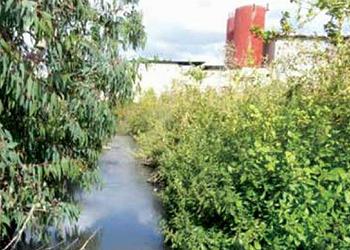
AMMAN, Jordan, February 20, 2017 (ENS) – The illegal trade and the manufacture and use of toxic pesticides in Israeli illegal settlements, result in human rights violations and contribute to the food insecurity in the Occupied West Bank, an international fact-finding mission concludes.
Pesticide run-off from agricultural operations and hazardous wastes from the manufacture of agrochemicals inside the illegal settlements poison Palestinian farms, livestock, and water sources, the investigators learned.
Dumping hazardous wastes in Palestinian territory has been documented, including in areas with a high concentration of schools.
The joint mission, conducted in May 2016, was led by the Arab Group for the Protection of Nature, APN, based in Amman, and the PAN Asia Pacific, PANAP, based in Malaysia, one of five regional centers of the Pesticide Action Network.

The investigation reveals the presence of highly hazardous pesticides banned by the Palestinian Authority, but illegally traded into the Occupied Palestinian Territories – pesticides such as endosulfan and Dukatalon, a mix of paraquat and diquat.
The two reports that came out of the investigation found that 50 percent of pesticides in Palestine are illegal, and that five metric tonnes of banned pesticides have been confiscated since 1995.
The Palestinian Authority is in no position to dispose of these chemicals safely, and Israel refuses to take them back, investigators found.
International pesticide specialist Dr. Meriel Watts of PANAP in New Zealand participated in the mission and co-authored the reports with Tanya Lee and Heather Aidy.
“It is unacceptable that the Palestinian Authority, with one of the tightest pesticide registration and compliance systems, including not allowing pesticides that are banned in their country of origin, is thwarted at every turn by the Israeli authorities who knowingly facilitate the entry of banned highly hazardous pesticides into the Occupied West Bank,” declared Watts.
Communities near Israel’s industrial settlements in the West Bank have reported contamination of their soil and drinking water, proliferation of disease-carrying mosquitoes, and increased incidence of respiratory and eye diseases, including among children.
Razan Zuayter, founder and Board Member of the Arab Group for the Protection of Nature, said, “Some of these agrochemical companies have been shut down inside the Green Line for violations of environmental and health regulations, but operate with impunity inside illegal settlements at the expense of the health, livelihood and environment of Palestinians.”

“Moreover,” said Zuayter, “the Palestinian Authority does not have access to information on the chemicals manufactured and used inside the illegal settlements.”
These activities have been found to violate Palestinians’ rights to information, self-determination, water, the highest attainable standard of health and a healthy environment and livelihood.
“Palestinian officials endeavour to run a process of strict control over pesticide importation and use, with tight control on registration and approved dealers, including frequent audits of shops. However, their efforts are severely undermined by the existing political situation – in particular, the refusal of Israel to allow the Palestinians to enforce Palestinian law, the failure of the Israeli military to allow Palestinians to police their border, and the failure of the Israelis themselves to stop the illegal trade. As a result, there is a very sizeable trade in illegal pesticides into the Occupied West Bank,” states the report entitled, “Pesticides and Agroecology in the Occupied West Bank.”
The Israeli State and agrochemical corporations have been identified as accountable for their failure to prevent the illegal trade, and for not providing access to just and fair redress and effective remedy, the reports conclude.
Zuayter objects to the chemical contamination and lack of information as violations of the human rights of Palestinians. “These human rights violations are perpetrated in the context of the Israeli occupation and expansion of the illegal settlements,” she says.
Zuayter cites Israeli control that prevents the Palestinian Authority from fully enforcing policies to restrict the trade, manufacture and use of around 200 registered active ingredients in the Occupied West Bank, and prevents the Palestinian Authority from responding to the chemical crisis.
The two reports were launched along with an international online petition outlining recommendations for the international community on February 20, World Social Justice Day 2017.
PANAP Executive Director Sarojeni Rengam said, “What more perfect timing to launch the reports but on World Social Justice Day, with the urgent need to bridge the accountability gap and hold the Israeli State and agrochemical companies legally liable for their injustice to the Palestinian people.”
Click on the links below to access the pair of reports:
Human Rights and Toxic Chemicals in the Occupied West Bank (Palestine)
Pesticides and Agroecology in the Occupied West Bank
More information at: #StopPoisoningPalestine, #WorldSocialJusticeDay, and #PesticidesFreeWorld
Copyright Environment News Service (ENS) 2017. All rights reserved.
© 2017, Environment News Service. All rights reserved. Content may be quoted only with proper attribution and a direct link to the original article. Full reproduction is prohibited.
